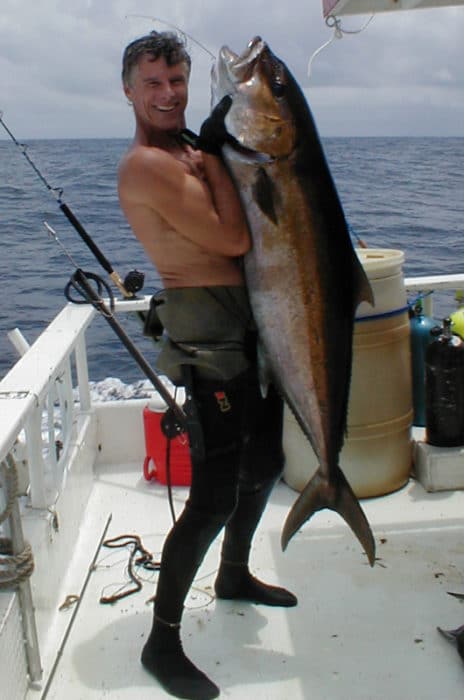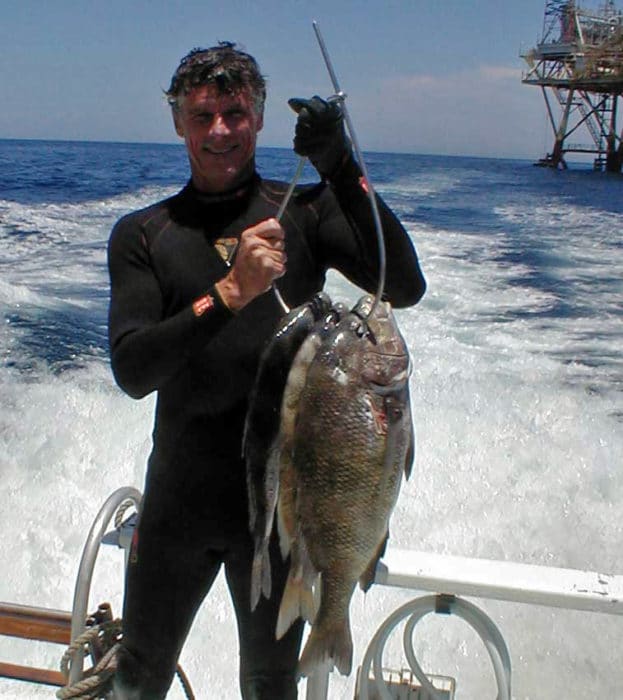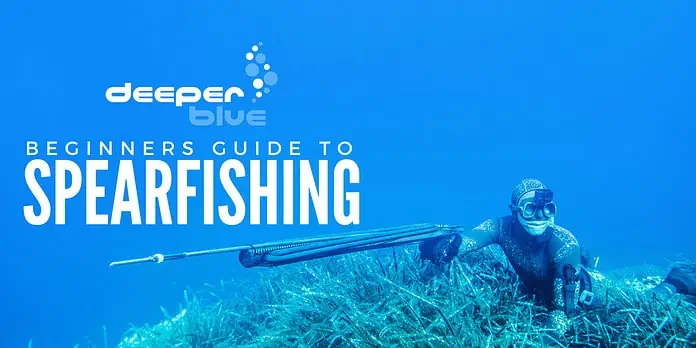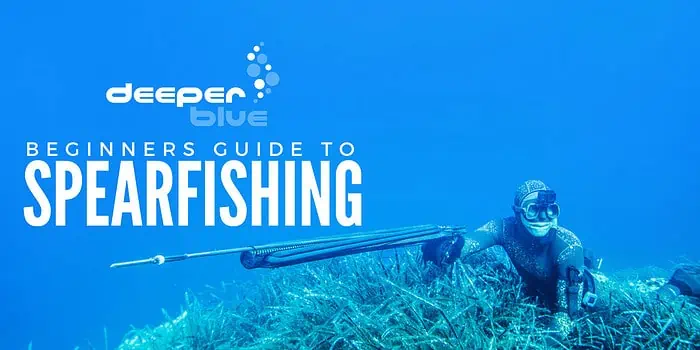Everyone knows fishing is super competitive, and since spearfishing requires athleticism, diving ability, hunting skills, use of primitive gear, and takes place in an alien underwater world, where survival alone is a challenge – it certainly gets your blood pumping! Competition starts among buddies on a boat, whoever brings up the biggest fish, the most fish, the most prestigious species, at the end of the day, is given the King of the Reef/Wreck/Ocean! No doubt, today’s pervasive photography stirs up the pot. Picture a diver, still dripping wet, on the platform, holding up a big snapper, and a speargun – click, then hit send, and it’s all over the web – it doesn’t get any better, especially when she out-shoots the whole boat!
Spearing competitively can be a lot of fun, as exciting as it is challenging and costly of time and money. Eventually, spearos join clubs, or dive with shops, and jump on multiple day spearing trips, which ramp up the competition. The Dry Tortugas was my initiation, all spearfishing, three to four days, sun up to sun down, it’s all a body can stand. Sometimes competition gets insane!

About my 40th trip was with a bunch of guys I didn’t know from Fort Myers, the boat’s home dock. As the locals arrived, I watched and listened as fish stories got loud quick, then fish pools opened at $20 a category. Only I and one quiet guy didn’t join, but by midnight on the boat ride I couldn’t bear the chiding anymore and relented. With the Tortugas sunrise, the diving began and soon the bragging got real quiet. At the trip’s end, the only local who had fish worthy of winning was my new buddy, that doesn’t gamble or brag.
Most tournaments are in spring and early summer, and being a dive instructor and working weekends, it made it hard to join. I shot a few tournaments after buying my first boat in 1980. Fortunately, the St Pete Open is held in late summer, and right in my hometown. It is one of the largest and longest running tournaments, starting in 1956. I made a lot of mistakes, which I’ll cover later, and include tips on how to increase scores. After buying a competitive boat in 1996, my present 36-foot charter boat, my buddies and I began winning several 1st & 2nd place categories. I became self-employed in 2000 and wrote for Spearfishing Magazine, which sent me to cover the 2002 Alabama Open Rodeo. So I entered and was high on the leaderboards until 2 Hell Divers, from Louisiana, knocked me down to a 3rd place amberjack. The next year they invited me to dive the Hell Diver Rodeo, which I did for 4 more years and won my share of trophies and prizes while helping the Hell Divers win the best club every year. I learned all about rodeos and rig spearfishing on scuba and skin diving, as the Hell Divers call freediving.
Open tournaments mean divers can choose to shoot in either scuba or freediving categories. Many tournaments only allow freedivers or skin divers, and some have a category for bluewater freediving. Other categories are men, women, and juniors, and separate fish species, and occasionally a miscellaneous category for everything else that’s legal.

The biggest mistake I made early on, was trying to run with the big dogs, in all the top categories. I should have focused on more realistic species categories since I had a 20-foot single engine boat and little local knowledge of spearfishing sites. The big dog’s boats doubled everything I had, and lifetimes of secret hotspots. It was still fun, but placing in the middle of the pack didn’t cut it. Since then, when in new areas, like Louisiana, where locals were faster shooting pelagic fish with riding rig guns, I shot a fast reel gun on sheepshead and mangrove snapper. Another mistake was not reading in detail all rules and category information. Hell Divers tipped me off about their 5-sheepshead aggregate category, (Their rodeo started with sheepshead only from Lake Pontchartrain). So, I shot 2 more and won the Sheepshead Champion Trophy, as well as 1st Place Sheepshead. Another mistake; don’t ever call the Hell Diver Rodeo a tournament! They’ll call you out on it, “It’s a rodeo, not a tournament like bull riding ain’t no tournament either!” A repeat Rodeo King concentrates on Mookie fish, which they call all the undesirable fish, like spadefish, black drum, carp, etc. He says, “A 1st place spadefish gets the same score as a 1st place red snapper, in this rodeo. As soon as you shoot a food fish you don’t need, a winning Mookie fish will swim right up to you!”
Equipment mistakes are common, like not replacing old bands or shooting lines. Bring a spare gun, just in case your primary gun breaks. A small stringer helped me place higher in freedive tourneys, because I kept shooting, and filling holes in my 20-fish quota. Wasting time hurts you and your buddies, so stay down only if you’re killing it. Ascend, get another drop, maybe on a winner. Don’t give fish to buddies, because scoring gets complicated, you might finish behind a diver that didn’t shoot a winner.
Concentrate on strengths of your area. East coast Florida divers couldn’t beat Gulf divers on grouper, but snapper and lobster were often taken by an east coaster. If you’re versatile, switch to a stronger dive style. A buddy and I won 1st and 2nd skin diver in a rodeo by switching from scuba, which was overloaded with good divers on the east side canyon rigs.
A slogan I wrote 17 years ago for advanced dive training is “The deeper you dive, the bigger the fish!” – True for competitive spearfishing on bottom fish like grouper, snapper, hogfish, for sure, and often for amberjack, cobia and more. Getting deep water trained and using appropriate gear can increase the odds of being successful and safe while hunting deep. Depth adds many problems for all divers. Freedive spearfishing beyond 80ft / 25m requires increasing breath hold capability and recovery breathing techniques, as well as advanced safety protocol, to be ready for blackouts. Polish up your hydrodynamics and use top performance fins, longer shooting spearguns, better slip-tips, and quality float lines & bungees. Scuba divers diving beyond recreational depths, 132ft / 40m is called technical diving today, which deals with high nitrogen and oxygen levels. Increased exertion and cold water often accompany deep spearfishing where DCS, narcosis and oxygen toxicity become more intense problems. First generation scuba spearfishermen did it dangerously on air. Technical Spearfishing is a term I coined in 2000, which describes the style of diving we were doing in tournaments & rodeos – several short, deep dives, (8 to 12 min., 155ft / 47m to 220ft / 67m.), with long surface intervals, using lean nitrox or mostly trimix, and with decompression gasses. We avoided bulky double systems with 4 or 5 tanks, that wreck & cave divers used at the time, opting instead for a large single tank with 2 complete regulators, 2 computers, a large but skinny deco system, with a sleek BC, low volume mask and long fins. Kind-of-like freediving on steroids! It worked very well for the next decade. I’ll probably technical spearfish in a few more tourneys or rodeos in the next few years, in the senior’s category if they have one.
A new tournament the last few years is open all year! It’s called the Florida Spearfishing Tournament. Freedivers or scuba divers buy a Florida Spearfishing Tournament hat and register online, then shoot fish and take a photo with the hat, the fish length measurement, a phone or dive computer with date & time, and a witness. Post it on their facebook page and hope you win your category at the years’ end. Speared Apparel and other sponsors have had some great trophies and prizes for this tournament, which were given out at a Christmas Party the last few years. It sounds like fun!
Years ago, in a big tournament, a diver collapsed on the deck of his boat and died, after too many dives over 200 feet, trying to retrieve a big grouper. Remember, no fish is worth dying for, or having a serious injury! And no matter how well you’ve done spearfishing, drive safe getting back to the weigh-in. The smartest thing we did, returning from one stormy Southern Open Tournament, was to slow down and throw in the towel, instead of racing through miles of tight channels, followed by a 20-mile drive on flooded streets. It cost us some wins, but only driving like a demon could have made it, and it’s not worth it!
Continue reading more from the DeeperBlue.com Beginners Guide to Spearfishing.


